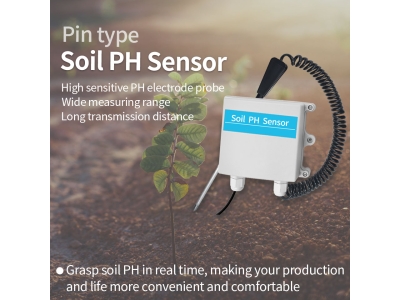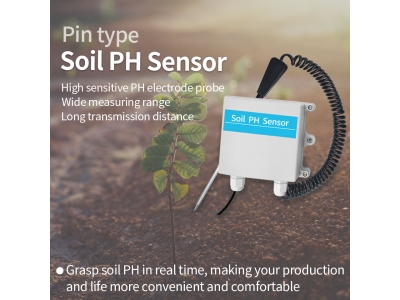Agriculture plays a vital role in meeting the world's ever-increasing demand for food, fuel, and fiber. However, traditional farming practices often result in inefficient resource management, reduced crop yields, and environmental degradation. In recent years, precision agriculture has emerged as a transformative approach to farming, utilizing advanced technologies such as soil sensor systems to optimize crop growth and improve overall agricultural sustainability. This article explores the concept of precision agriculture and its significant impact on optimizing crop growth through the use of soil sensor systems.
Precision Agriculture: A Paradigm Shift in Farming
Precision agriculture, also known as site-specific farming or satellite farming, encompasses a range of technologies that enable farmers to manage their fields more precisely and efficiently. This approach involves the integration of various tools, including global positioning system (GPS), geographic information system (GIS), remote sensing, and soil sensor systems. By collecting and analyzing data from these systems, farmers can make informed decisions about crop management, leading to improved productivity, reduced costs, and minimized environmental impacts.
The Role of Soil Sensor Systems in Precision Agriculture
Soil sensor systems are at the core of precision agriculture, providing essential insights into soil conditions and enabling farmers to optimize crop growth. These systems consist of a network of sensors placed within the soil profile, measuring critical parameters such as moisture content, temperature, pH level, nutrient availability, and salinity. By continuously monitoring these variables, soil sensor systems offer real-time data that helps farmers make accurate decisions regarding irrigation, fertilization, and other crop management practices.

Applications of Soil Sensor Systems in Crop Management
Soil sensor systems have revolutionized crop management practices by enabling farmers to apply inputs only where and when they are needed, minimizing waste and maximizing crop productivity. Some key applications of soil sensor systems in precision agriculture include:
Irrigation Management: Soil moisture sensors provide real-time data on soil moisture levels, allowing farmers to make informed decisions about irrigation scheduling. By avoiding overwatering or underwatering, farmers can optimize water usage, reduce energy consumption, and prevent waterlogging or drought stress in crops.
Nutrient Management: Soil sensor systems enable accurate monitoring of nutrient content within the soil. By measuring factors such as nitrogen, phosphorus, and potassium levels, farmers can precisely apply fertilizers in the right amounts and at the right time. This not only increases crop yield but also minimizes nutrient runoff and pollution, promoting environmental sustainability.
Soil Health Assessment: Soil sensors provide valuable insights into soil health parameters, including pH levels and organic matter content. With this information, farmers can adjust management practices to improve soil fertility, structure, and overall health. Healthy soils promote robust plant growth, reduce erosion, and enhance long-term agricultural sustainability.
Crop Disease and Pest Management: Soil sensor systems can detect early signs of plant pathogens and pest infestations by analyzing changes in soil conditions. This early identification allows farmers to take timely preventive measures, such as precision application of pesticides or biological control methods, minimizing crop damage and reducing reliance on agrochemicals.
Benefits of Soil Sensor Systems in Precision Agriculture The use of soil sensor systems in precision agriculture offers several significant benefits for farmers, the environment, and society as a whole:
Increased Crop Yields: By monitoring and optimizing soil conditions, farmers can create an ideal growing environment for crops, leading to improved yields and profitability.
Resource Efficiency: Soil sensor systems enable precise irrigation and nutrient management, reducing water and fertilizer wastage. This not only conserves valuable resources but also lowers production costs for farmers.
Environmental Sustainability: Precision agriculture with soil sensor systems helps minimize the environmental footprint of farming. By reducing nutrient runoff, water pollution, and pesticide residues, it promotes sustainable agricultural practices and protects the surrounding ecosystem.
Improved Data-Driven Decision Making: Real-time data from soil sensor systems empowers farmers to make informed decisions based on accurate assessments of soil conditions. This enhances overall farm management and increases efficiency in resource allocation.
Future Perspectives and Challenges The future of precision agriculture with soil sensor systems holds immense potential for further advancements and innovations. Some areas of development include:
Integration of S






